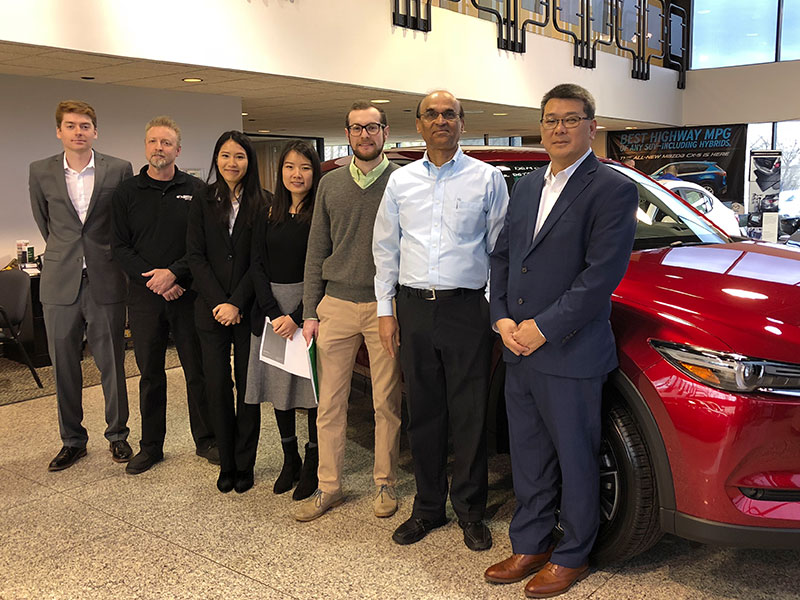School of Management, Mazda explore how to make after-sales service more efficient
Faculty and students from Binghamton University team up with Mazda to tackle real-world problems

For car dealerships, selling the car is just the start.
As with many industries, the after-sale services provided to customers are just as important, if not more important, than making the initial sale. And when it comes to after-sale service in the car industry, keeping customers satisfied requires a delicate balance of many factors.
“We’re looking at things like are there enough stalls, enough facilities, enough workers, enough parts, enough everything to handle all of the customers who need services or repairs,” said John Hay, a regional service and parts manager at Mazda North American Operations.
To help determine the best way to strike this balance, Mazda is teaming up with a group of Binghamton University School of Management students overseen by Professor Saligrama Agnihothri and Assistant Professor Leon Cui. The team is hoping to determine the “true capacity” of Mazda dealerships in hopes that the businesses can efficiently maximize the number of overall service hours they can provide, while also ensuring that customers don’t have to wait an unreasonable amount of time for their cars to be serviced.
“In order to determine capacity, you first need to understand the demand characteristics,” Agnihothri said. “And that is driven by factors such as the number of Mazda vehicles there are in a given market, what model they are, their failure rates, how old they are — there is a lot involved.”
To get a better idea of just how much is involved, Agnihothri and his team needed to first get a crash course in the car industry, as well as how Mazda operates, before applying their supply chain management expertise.
“We had little to no idea of where this project was going to take us,” said Chengyao (Alivia) Zhou ’16, MBA ’18, one of the students working on the project.
In order to get a sense of direction, the students conducted literature reviews of past research on the relationship between efficiency, wait time and customer satisfaction. The group also visited Mazda dealerships in New Jersey and held weekly conference calls with the company to make sure they had a full understanding of how the business works.
“The dealership visit was very helpful, as we were able to identify some of the bottlenecks in the dealership operation. We also identified some of the key characteristics of customer demand and dealership characteristics on the supply side,” Zhou said.
The team is hoping to develop a comprehensive model that accounts for all of the factors that affect the overall demand to determine true capacity. Dealerships would be able to plug in data that applies to their location in order to obtain specific insights into how they could make their operations more efficient.
There are many uncertainties involved with determining demand and capacity though, and that creates a challenge for the team.
“If the demand is constant, I can easily plan for my capacity. But in the service industry, demand can be random, based on so many factors. For example, there may be an unexpected snowstorm, which results in more accidents, which then results in more cars coming in for repairs. There are things you can’t always anticipate,” Agnihothri said.
Peak demand is what companies should be interested in managing, ensuring they are ready for all possibilities, he said.
The working relationship with Mazda has benefits for both the company and Binghamton University. Mazda is getting insightful consultation from a group of supply chain experts looking to help provide solutions.
“The Binghamton students we’ve worked with have all been very smart, and smart people figure things out,” Hay said. “All we do is educate them on the industry and the issues, and they are able to figure it out from there. We give them the latitude to make decisions and plans, and they give us solutions.”
“They are bringing things to our attention that we may have overlooked because they’re coming at this from an outside-looking-in perspective. At the same time they are painting a very clear picture for us, and they are able to articulate their observations very well,” said Kamyar Rahnemoon ’12, a district service manager with Mazda North American Operations.
As for the Binghamton students, they are getting invaluable hands-on, real-world experiences.
“We are treated as contributing team members rather than simply as students,” said Jessica Vecchiariello ’17, an MBA student currently working on the project. “We’re working directly with the Mazda team, and that has prompted us to put our best foot forward in terms of content and presentation.”
“We have the opportunity to actually work on a real-life case that isn’t from a textbook. It’s helping me work on critical thinking, team collaboration, organization and communication skills, and it’s helping me become much more prepared for life after graduation,” said Zhou.
“I think everything the School of Management offers ensures that students are getting the most out of their education,” she said. “This isn’t just a regular course, this is an experience.”

